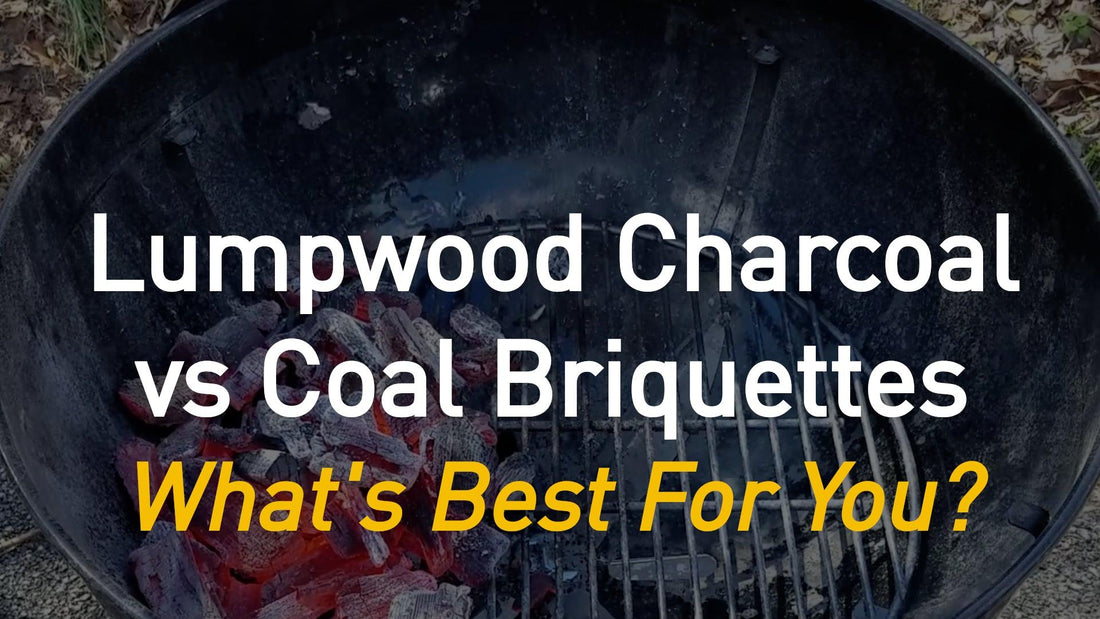
BBQ Briquettes Vs Lumpwood Charcoal: What’s Right For You?
Charcoal is king. Despite often being overlooked by amateur grilling enthusiasts, your choice of charcoal has a profound impact on how your food ends up tasting. Poor quality charcoal can ruin even the juiciest steak and most perfectly seasoned burger. Quality chef-grade charcoal, on the other hand, can help elevate the taste of any meat or vegetable prepared using it.
But product quality isn’t the only thing you have to pay attention to. There are actually two different types of BBQ charcoal you buy in the UK today: traditional lumpwood charcoal and manufactured BBQ briquettes. These two options are made from different raw materials, are processed using different production methods, and have different burning properties, which have a direct effect on the way they grill your food.
In this article, we will go over the key differences between natural lumpwood charcoal and charcoal briquettes. Let’s explore.
- The Best Pizza Oven Wood: Make the Perfect Slice
- Upgrade Your BBQ: UK Chef-Approved Lumpwood Charcoal
- Top Side Dishes For the 2022 UK BBQ Season
What Is Lumpwood Charcoal?
The favourite charcoal choice of restaurant chefs and BBQ enthusiasts all over the world, lumpwood charcoal is easy to light, burns cleanly and at an exceptionally high temperature, and responds super fast to airflow controls, giving you full control over the temperature you cook your food at. It is more expensive than charcoal briquettes, but most enthusiasts say the extra price is more than worth the upgrade in performance.
What Is Lumpwood Charcoal Made of?
Lumpwood charcoal is made solely from high-quality natural wood logs from hardwood tree species. No chemicals are added to the charcoal during the manufacturing process. Popular raw material options for lumpwood charcoal include oak, alder, and birch.
How Is Lumpwood Charcoal Made?
Lumpwood Charcoal is manufactured by baking pre-split hardwood logs at a low temperature for a long time in a near-oxygenless environment. This manufacturing process removes all moisture and impurities from the coals. As a result, what’s left is almost 100% pure carbon.
What Is Lumpwood Charcoal Used For?
Thanks to its high heat output and quick response to airflow controls, lumpwood charcoal is perfect for all grilling scenarios, from searing steaks to grilling to hamburgers. What’s more, its chemical-free composition makes it ideal for people who dislike the idea of lighter fluid and binder chemicals coming anywhere near their food.
Is Lumpwood Charcoal Right For Me?
Choose lumpwood charcoal over charcoal briquettes if you are okay with paying a little bit more for higher quality heat and a chemical-free grilling experience.
What Are Charcoal Briquettes?
Charcoal briquettes are a mass-manufactured grilling fuel that is made from compressed charcoal dust compressed into briquette form with the help of chemical binder fluid. Charcoal BBQ briquettes are inexpensive, available in virtually any supermarket, and can do the job just fine for people who are looking for the cheapest way to get a grill going. If you have the time for it, you can even make charcoal briquettes yourself.
What Are Charcoal Briquettes Made of?
Charcoal Briquettes are made from coal dust, a common manufacturing waste product, binding chemicals, and lighter fluid.
How Are Charcoal Briquettes Made?
The coal dust is mixed with binding chemicals and compressed into the desired shape. As the resulting product is very difficult to light, manufacturers often lighter fluid to the mixture to make the lighting process easier.
What Are Charcoal Briquettes Used For?
Charcoal Briquettes can be used for virtually any BBQ grilling scenario, although they may not be perfect for searing steaks and other foods that require very high heat.
